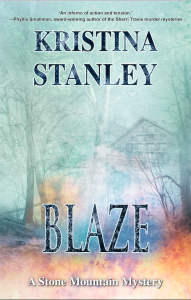 I'm delighted to welcome back Kristina Stanley to Cyber Café. We first became friends at Bloody Words, Canada's late great national mystery conference. Both of our books had been finalists for CWA's Debut Dagger and the Arthur Ellis Unhanged Arthur awards.
Kristina very generously shares her writing skills and techniques on her website - a must for all aspiring writers. She's also superb at book marketing. Her book, The Author's Guide to Selling Books to Non-book Stores, is a must-read for all authors.
Like most writers, I find rewriting a challenge. Kristina is developing a digital tool to help authors reshape their manuscripts into books that readers will love. I can't wait to apply it my own work!!
Today Kristina tells us about this innovative approach to rewriting.
I'm delighted to welcome back Kristina Stanley to Cyber Café. We first became friends at Bloody Words, Canada's late great national mystery conference. Both of our books had been finalists for CWA's Debut Dagger and the Arthur Ellis Unhanged Arthur awards.
Kristina very generously shares her writing skills and techniques on her website - a must for all aspiring writers. She's also superb at book marketing. Her book, The Author's Guide to Selling Books to Non-book Stores, is a must-read for all authors.
Like most writers, I find rewriting a challenge. Kristina is developing a digital tool to help authors reshape their manuscripts into books that readers will love. I can't wait to apply it my own work!!
Today Kristina tells us about this innovative approach to rewriting.
Rewrite Your Way to a Great Novel Readers Will Love
Do you want to write a novel readers will love? If the answer is yes, you probably know that means a lot of hard work rewriting.
Whether you’re a plotter or a panster, once you’ve completed a first draft you might be asking yourself:
- Where do I start my manuscript rewrite?
- How do I keep track of all the writing tips I’ve read and apply them to my story?
- What should I change to make my story better?
- Am I ready to share my manuscript with others?
- Wouldn’t it be nice to have an app that would help you through the rewriting process?
What is Rewriting?
A rewrite is the first step in the self-editing process. I’m not talking about copyediting or proofreading. You can do that after you’ve completed your rewrite.
Rewriting your first draft means analyzing your story from a high-level perspective and fixing any weak areas. You want to make sure that the story structure makes sense, the scenes are tense, there are no plot holes, and you haven’t left any subplots unfinished.
Plot describes the events that take place in your story. The events occur in a sequence, and that sequence forms the structure of your novel. You’ll most likely have a main plot and one or two subplots. Your protagonist (main character) follows the main plot. Secondary characters follow the subplots.
During the rewrite, you also take a hard look at your characters. When you’ve finished your first draft, you know who your characters are, what they look like, where they work and so on. But what about how they fit into your story structure?
To understand this and make the most of it, you evaluate your characters in the context of the structure of your novel. How often do they appear? What are their goals? What gets in the way of their goals? Characters will drive the tension in your story, and tension is what keeps a reader reading.
Finally, the rewrite should examine your settings. Do you make the most of your settings? How often do you use the same setting, and is it too often? Do your settings help with the tone of your scenes, add conflict or tension, or show characterization? Make your setting work hard to keep the reader engaged.
Once you’ve determined the setting for each scene, ask yourself if the setting is the best place for emotional impact. This one little question helps you increase or decrease tension, set the mood and/or show characterization.
That’s a lot for a setting to do for you, but thinking about setting in terms of emotional impact will wake up your creativity.
How can Feedback help you?
We’re building Feedback, an app for writers that provides a guided approach to tackling comprehensive rewrites. Save time by rewriting efficiently. Save money on editing by doing as much as you can yourself.
Feedback will guide you through the rewriting process by asking you questions specific to your manuscript, enabling you to evaluate your own story.
With Feedback, you focus on plot, character, and setting. You evaluate on a scene-by-scene basis or on overall novel structure. Feedback will show you the most important structural elements to work on first.
Feedback helps you visualize your manuscript. Forget about yellow stickies or white boards. Feedback will draw character arcs, provide reports on scene evaluation, and show your rewriting progress.
Feedback is a learning tool. If you’re having trouble with a certain element of fiction, just click on the rewrite tip associated with that element and find out how to improve your writing. There’s no need to search through dozens of writing books to find the piece of advice you need.
On the technical side, Feedback will be a secure, web-based app. This means you will be able to access Feedback from any device you use.
Find out more:
Our goal is to launch Feedback in the spring of 2017. In order to create an app that is valuable to writers, we’d like your input on building Feedback. Sign up, and we’ll send you updates on the development progress and ask you the occasional question to help define the product. As a bonus, we’ll send you rewriting tips available only to our subscribers.
Are you as excited about Feedback as we are? Show your support by helping us spread the word and share this post. You can find us at www.FeedbackForFiction.com.
Your support means a lot to us, so thank you!
Kristina Stanley is the best-selling author of the Stone Mountain Mystery Series. Her first two novels garnered the attention of prestigious crime writing organizations in Canada and England. Crime Writers of Canada nominated DESCENT (Imajin Books, July 2015) for the Unhanged Arthur award. The Crime Writers’ Association nominated BLAZE (Imajin Books, Oct 2015) for the Debut Dagger. Imajin Books published her third novel in the series, AVALANCHE, in June 2016.
Her short stories have been published in Ellery Queen Mystery Magazine and The Voices From the Valleys anthology. She is the author of THE AUTHOR’S GUIDE TO SELLING BOOKS TO NON-BOOKSTORES.
As the co-founder and Chief Creative Officer of Feedback Innovations, a company started to help writers rewrite better fiction, she made up her own job title because she thought it sounded cool!
To learn more about Kristina and her books, visit her website at https://kristinastanley.com/

![Pageflex Persona [document: PRS0000040_00072]](https://mhcallway.com/wp-content/uploads/2016/03/DESCENT-Cover-200x300.jpg)
